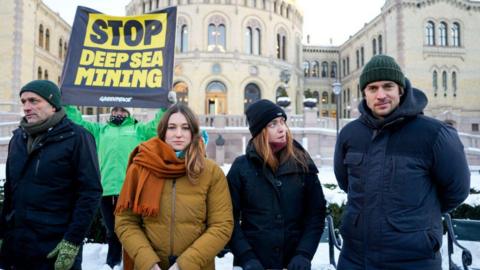Prime Minister Jonas Gahr Stoer called Sunday's development a “postponement” and said preparatory work on regulations and environmental impact would continue.
Greenpeace Norway's Haldis Tjeldflaat Helle said the pause was "a huge win".
"It has been truly embarrassing to watch Norway positioning itself as an ocean leader, while planning to give green light to ocean destruction in its own waters."
The country's energy ministry has not yet commented.
Norway became the first country in the world to move forward with commercial-scale deep-sea mining when it approved the plans in January.
The deep sea is home to minerals such as lithium, scandium and cobalt - which are critical for green technologies.
Although the metals are available on land, they are concentrated in a small number of countries, increasing the risk to supply.
Oslo said it did not want to rely on China for such materials, stressing it would only begin issuing licences once more environmental research was carried out.
The move put Norway at odds with the EU and the UK, which have called for a temporary ban on the practice due to concerns about environmental damage.
More than 100 EU lawmakers called on Oslo to reject the project, citing the risk "to marine biodiversity and the acceleration of climate change".
The country’s Institute of Marine Research criticised the government’s research into the move's environmental impact - saying five to 10 more years of work were needed.
The World Wide Fund for Nature (WWF) Norway said in a statement last week it was suing the government over the plans.
At least three Norwegian seabed mineral start-ups had said they would bid in the first licensing round.
On Monday, one of the start-ups - Green Minerals - said it expected a delay of up to a year following the plans' suspension.
